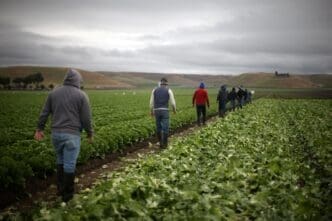Immigrant farmworkers are preparing for incoming U.S. president Donald Trump’s promise of mass deportations, including by assigning guardians for their children if they are detained, according to groups providing them legal support.
Rising demand for such legal services reflects anxiety that Trump will follow through on a campaign vow to deport millions of undocumented immigrants once he is sworn in to office Jan. 20, something that could have an outsized impact on the country’s agricultural sector, which heavily relies on their labor.
About half of hired farmworkers nationwide lack legal immigration status, according to the U.S. Department of Agriculture, and farm trade groups have warned deporting them could bring the country’s food production to a halt.
“The administration is not yet sworn in, but people are already afraid,” said Sarait Martinez, executive director of the Centro Binacional para el Desarrollo Indígena Oaxaqueño (CBDIO), an organization that supports indigenous Mexican farmworkers in the Central Valley of California.
Representatives of four U.S. rural and legal advocacy organizations, including CBDIO, told Reuters they have seen as much as a ten-fold increase in interest from immigrant farmworkers in workshops and resources they provide on what to do if confronted by immigration officials and how to ensure their family’s security if they are detained.
The workshops can include role-play confrontations with immigration officials and instructions on how to prepare for potential enforcement: like filling out forms assigning temporary guardians to their children, assigning an alternate to pick up pay, or giving permission for their children to travel internationally in the event they are deported.
Alfredo, a farmworker in Washington State who asked to be identified only by his first name due to concerns he could be targeted, said he is taking part in some of the trainings so he can pass along what he learns to fellow workers.
“We are definitely very concerned,” he told Reuters. “We really take pride in doing farm work, but it’s becoming very hard to look forward to going out to work.”
AGAINST THE CLOCK

In his first administration from 2017-21, Trump’s government conducted worksite raids at poultry processing plants and produce processing facilities in Nebraska.
The incoming Trump administration has said it will prioritize the deportation of people in the country illegally who pose a public safety or national security threat, but has not ruled out extending deportations more broadly to undocumented farmworkers.
“President Trump will enlist every federal power and coordinate with state authorities to institute the largest deportation operation of illegal criminals, drug dealers, and human traffickers in American history while simultaneously lowering costs for families and strengthening our workforce,” said Karoline Leavitt, spokeswoman for the Trump administration transition team.
Farm industry trade groups are worried about the potential impact on food production, and especially in California.
A third of U.S. vegetables and three-quarters of fruits and nuts are produced in the state, along with huge quantities of dairy and livestock, according to the California Department of Food and Agriculture.
All that food is harvested and processed by about 400,000 farmworkers, according to state employment data. And about 75% of those are undocumented workers, according to the University of California-Merced Community and Labor Center.
Despite the high proportion of undocumented immigrants, there is little access to appropriate legal services for farmworkers in some of the state’s largest agricultural counties, said Ivette Chaidez Villarreal, civic engagement program director at Valley Voices, a workers’ rights and voter education group in the Central Valley.
Since November’s election, the organization has grown its work on immigration services due to a high volume of legal questions and requests from farmworkers. It is also working with other California groups to create a rapid response network to support workers who may be subject to raids, Villarreal said.
Farmworkers often struggle to access legal services because of their rural location, said Patricia Ortiz, immigration legal director at California Rural Legal Assistance, which is developing resources for farmworkers.
“It puts them in a more precarious situation than other workers,” she said.
Undocumented workers who have U.S.-born children are particularly worried about being separated from their families, said Martinez of CBDIO. About 4.4 million U.S.-born children live in a household with at least one unauthorized immigrant parent, according to the Pew Research Center.
Martinez said many of the workers her group is helping speak languages like Mixteco and Zapoteco, and not Spanish or English, and are seeking help with immigration paperwork and securing passports for their U.S.-born children.
Across the country in upstate New York, the Cornell Farmworker Program has increased its immigration workshops ten-fold since before the election, and expects to soon hold one every day, said director Mary Jo Dudley.
Using role-play, trainers show workers ways to respond to immigration officials if stopped on the street or approached at their homes, Dudley said.
“We’re working against the clock,” she said.
Reuters/Reporting by Leah Douglas; Editing by Aurora Ellis








